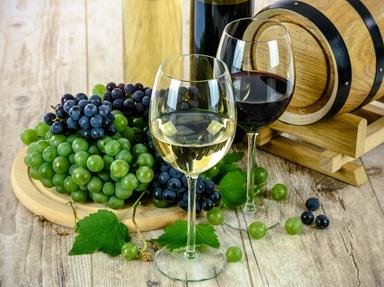Quiz Answer Key and Fun Facts
1. One of the fathers of wine criticism, this famous Roman was killed by the eruption of Vesuvius in 79 CE. Don't confuse him with his young nephew. Who praised Falernian wine and died at Pompeii?
2. The vigorous debate over the perceived health benefits of wine is nothing new. Which early advocate of Christianity advised his friend Timothy: "No longer drink only water, but use a little wine for your stomach's sake and your frequent infirmities"?
3. A noted Argentinian, who since March 2013 resides within an enclave in Rome, remarked in 2016 that "water is necessary to live, but wine expresses the abundance of the banquet and joy of the celebration... wine is necessary for the celebration". Who is he?
4. Which American polymath, agronomist, architect, President, and would be viticulturist opined that "no nation is drunken where wine is cheap, and none sober where the dearness of wine substitutes ardent spirits as the common beverage"?
5. He was one of the popularizers of the Cabernet Sauvignon grape for fine wine, led the making of one of history's finest wines at a war plundered winery, and forced the French government to change a famous wine estate ranking. What scion of a legendary Jewish banking family became a legend in the wine world himself?
6. This august Hungarian achieved so many firsts, he likely merits his own quiz. He is acclaimed as the "Father of Modern California Wine-making" and he founded Buena Vista winery in Sonoma county. Who was this remarkable wine Baron?
7. A big part of California wine history allegedly started with a sibling fistfight in the early 1960s over how the family winery, named Charles Krug after a previous owner, was to be run. Younger brother Peter lost the fight, but won the winery with family backing and the elder brother was shown the door. That exiled brother went on to become one of the leading lights in California wine and his name is on millions of bottles of wine. Who was he?
8. Nearly everyone understands the profound influence of Italian and French immigrant winemakers on California wine history. But perhaps the greatest influencer of the 20th Century was Russian born Andre Tschelischeff (CHELL-ih-cheff) who mentored such luminaries as Louis Martini and Robert Mondavi. Some 20 years after Tschelischeff's family fled the Russian Revolution, Franco-American winemaker Georges de Latour brought him to a "good place" in Napa Valley, where he remained until his death in 1994. What winery was it?
9. Michel Rolland is the owner of several well respected wine estates in Bordeaux, France and around the world. His fame, however, comes from his ability to work with other winemakers to improve their products. What do we call someone who does this?
10. It appears that only once in the millenia long history of wine that a single person so completely defined a type of wine that it became a legal standard. In 1872, Baron Bettino Ricasoli, heir to a seven century old wine-making family, developed the formula (in use today with minor changes) for a wine that defines Tuscany almost as much as the area's Etruscan heritage. What wine would this be?
Source: Author
Jdeanflpa
This quiz was reviewed by FunTrivia editor
jmorrow before going online.
Any errors found in FunTrivia content are routinely corrected through our feedback system.
